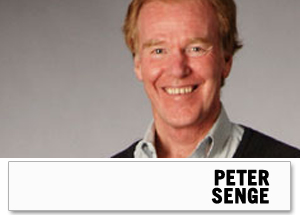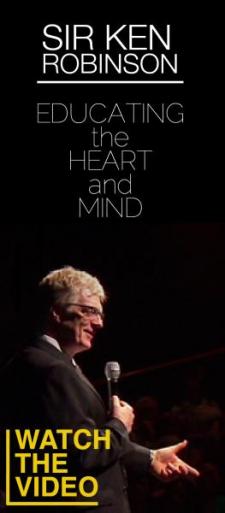Bibliography

Articles, Commentary, Lectures
Senge, P.M. (April 2002). Creating the world anew. The Systems Thinker 13-3, 2-6.
We have become increasingly reliant on the Western approach to science and technology to increase our effectiveness in the world, but this has undermined our capacity to connect with others and with nature. By-products of modern science and technology include isolation, waste, and a false sense of security. The article describes the profound shift that is occurring in the scientific worldview today, one that could eventually lead toward greater human development and innovative approaches to living together. It describes systems tools and new ways of knowing that can help us. When we realize that we ourselves are part of the problem, we can finally begin to effect true change.
Senge, P.M., Scharmer, C.O., Jaworski, J., Flowers, B.S. (2004). Awakening faith in an alternative future. Reflections: The SoL Journal 5-7, 1-11.
Based on extensive research, first-hand experience, and a multi-year dialogue, the authors of the book Presence: Human Purpose and the Field of the Future have concluded that in order to “create the world anew” we must all participate in changes that are both “deeply personal and inherently systemic.” The article shares highlights of the authors’ exploration into the essence of generative learning.
Senge, P.M. (Ed.). (2004). Creating desired futures in a global society. Northeast Sun 22-2, 11-19.
This article was adapted from Peter’s remarks at SoL’s first Global Forum, June 2003, Helsinki, Finland. He discusses large-systems change, sustainability, the future of education, and leadership development, along with addressing the question that is also a focus of his work: How can organizations and societies create desired results in an increasingly interdependent world?
Chapters
Senge, P.M. (2002). A world shaped by choice. In Williamson, M. (Ed.) Imagine, essays on the future. Emmaus, PA: Rodale Press.
Senge, P.M., & Carstedt, G. (2002). Innovating our way to the next industrial revolution. In Leibold, M., Probst, G., & Gibbert, M. Strategic Management in the Knowledge Economy. Hoboken, NJ: John Wiley & Sons, Inc.
Senge, P.M. (2004). Spirituality in business and life: Asking the right questions. In Going Public: Spirituality in Higher Education and the Workplace. New York: Peter Lang Publishing Group.
In this book excerpt, Senge says, “The ways we think and act create our system of commerce, which cannot be changed by any one person. Yet on all levels it can be changed, but we have to decide; we have to choose that we want to live a different way and then decide what we are going to do today and tomorrow. Perhaps in this way, we will bring spirituality to the workplace.”
Senge, P.M. (2004). Leadership and organizational change. In Hugos, M. Building the real-time enterprise: An executive briefing, 10-11. Hoboken, NJ: John Wiley & Sons, Inc.
Senge, P.M. (2005). A world shaped by choice. In Intrator, S.M. (Ed.), Living the Questions: Celebrating the Life and Work of Parker J. Palmer. San Francisco: Jossey-Bass.
Books
Senge, P.M. (1990). The fifth discipline: The art and practice of the learning organization. New York: Doubleday Publishing.
Over 100 pages based on interviews with dozens of SoL practitioners. Examines the successes and challenges of a broad array of projects. Outlines the "state of the art" of organizational learning and presents eight strategies to employ in service of that art.
In follow-up, Senge and his co-authors have since written a series of Field Books based on the ideas in The Fifth Discipline, including Strategies & Tools for Building a Learning Organization (1994); The Dance of Change (1999); and Schools That Learn (2000). See descriptions below.
Senge, P.M., Kleiner, A., Roberts, C., Ross, R., Smith, B. (1994). The fifth discipline fieldbook: Strategies and tools for building a learning organization. New York: Crown Business.
Senge offers executives a step-by-step guide to establishing and building learning organizations within existing companies functions as a participative workbook, with exercises for individuals and teams, suggested approaches and ideas, and success stories. (See above for the 1990 groundbreaking book.)
Senge, P.M., Kleiner, A., Roberts, C., Ross, R., Roth, G., & Smith, B. (1999). The dance of change: The challenges to sustaining momentum in learning organizations. New York: Doubleday Publishing.
Published nearly a decade after Senge’s 1990 book, The Fifth Discipline, this “field book” provides a formidable response to businesspeople wondering how to make his programs stick. Senge outlines potential obstacles and proposes ways to turn these obstacles into sources of improvement and presents experience-based suggestions and exercises for individuals and teams.
Senge, P.M., Cambron McCabe, N.H., Lucas, T., & Kleiner, A. (2000). Schools that learn: A fifth discipline fieldbook for educators, parents and everyone who cares about education. New York: Doubleday Dell Publishing Group, Inc.
Focuses on the five disciplines of personal mastery, mental models, shared vision, team learning, and systems thinking. Senge breaks down the long-standing industrial model of education and replaces it with a strategic approach to organizational change through use of whole systems design. He incorporates the viewpoints and research of authors and researchers across the field of education. An incredible resource for everyone mentioned in the subtitle, the book is user friendly and designed so you can start reading at any section. Web links, exercises, and recommended books and articles. Read the review in Harvard Educational Review.
Senge, P.M., Flowers, B., Scharmer, O., Jaworski, J. (2004). Presence: Human purpose and the field of the future. Society for Organizational Learning.
An astonishing and completely original look at change and learning. Explores the nature of transformational change. Introduces the idea of “presence”—a concept borrowed from the natural world that the whole is entirely present in any of its parts—to the worlds of business, education, government, and leadership. Drawing on the wisdom and experience of 150 scientists, social leaders, and entrepreneurs, the book is both revolutionary in its exploration and hopeful in its message.
Senge, P.M., Flowers, B., Scharmer, O, & Jaworski, J. (2005). Presence: An exploration of profound change in people, organizations, and society. New York: Doubleday Publishing.
Follow-up to the book above.
Senge, P.M., Laur, J., Schley, S., Smith, B. (2006). Learning for sustainability. Society for Organizational Learning.
A SoL resource, written as a vehicle for sparking conversation and encouraging dialogue about how to develop the confidence and capabilities to create a world we will be proud to leave our grandchildren. A collection of 12 articles and exercises intended for leaders at levels, engaged in all types of enterprises, local and global.
Senge, P.M., Smith, B., Kruschwitz, N., Laur, J., & Schley, S. (2008). The necessary revolution: How individuals and organizations are working together to create a sustainable world. New York: Doubleday Books.
A look at how corporations and organizations are searching for new strategies, techniques, innovations, and goals in order to meet the environmental crises and challenging societal issues and to find creative solutions. The authors reveal how companies around the world are boldly leading the change from dead-end “business as usual” tactics to transformative strategies that are essential for creating a flourishing, sustainable world. Using inspiring stories from individuals and organizations tackling social and environmental problems around the globe, the book describes how ordinary people at every level are transforming their businesses and communities. Contains a wealth of strategies, specific tools, and ways of thinking to help us build the confidence and competence to respond effectively to the greatest challenge of our time. An essential guidebook for all of us who recognize the need to act and work together to create a sustainable world.





